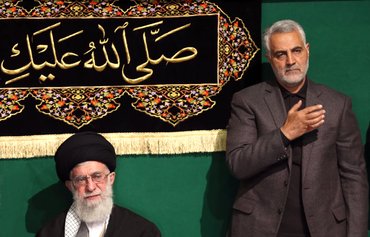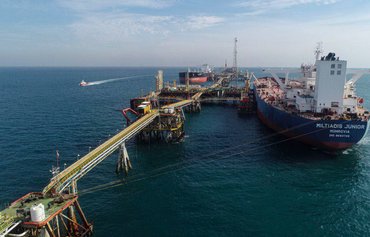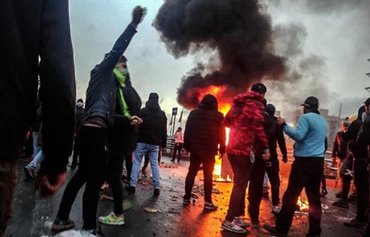Though widespread protests in Iran have urged the regime to focus resources on domestic issues, it has taken measures to divert funds allocated to the country's sovereign wealth fund for use in military operations.
Iranian media in February reported that lawmakers had approved the withdrawal of $1.5 billion from the National Development Fund to pay for military expenses.
Last year, Iran's supreme leader Ayatollah Ali Khamenei ordered the withdrawal of $2.5 billion from the fund to be spent on military projects.
Iran's National Development Fund was established "to allocate a portion of the revenue generated from oil, gas and various oil products to non-oil and productive investments, and save a portion of the revenues for future generations", said Ain Shams University professor Shaher Abdullah.
![Maj. Gen. Qassem Soleimani (R), commander of the IRGC's Quds Force, poses with Afghan militia fighters in Syria. [Photo circulated on social media]](/cnmi_di/images/2019/03/12/17074-Syria-Suleimani-Afghan-600_384.jpg)
Maj. Gen. Qassem Soleimani (R), commander of the IRGC's Quds Force, poses with Afghan militia fighters in Syria. [Photo circulated on social media]
This year, Khamenei instructed parliament to amend the draft budget for the fiscal year 2019 so that 20% of oil revenue is paid into the National Development Fund, versus the originally planned 30%, Iranian media reported.
"This amount is quite modest, given the decline in oil exports due to the sanctions imposed on Iran and the drop in global oil prices," Abdullah said.
The recent decision to withdraw $1.5 billion from the fund "comes at a time when the Iranian economy needs to make a rapid recovery from the recent decline during which it contracted by 5.5%", he told Diyaruna.
Money belongs to Iranian people
Iran's Islamic Revolutionary Guard Corps (IRGC) "continues to support its foreign operations with money that belongs to the Iranian people", said al-Sharq Centre for Regional and Strategic Studies researcher Fathi al-Sayed.
The IRGC is supporting Iran's proxies in Lebanon, Syria, Iraq and Yemen, he told Diyaruna, adding that "maintaining control over these sectarian groups requires a constant flow of weapons and funds".
The IRGC receives funding from Iran's general budget as well as from other sources, including the National Development Fund, he said, with its main budget totaling $3.3 billion in 2013 and swelling to approximately $7 billion in 2017.
"These figures pertain to the IRGC alone and do not include similar figures allocated for defence and army-related purposes, which also go into the IRGC’s coffers," he said.
The unemployment rate among university youth in Iran is very high and is exacerbated by the current economic crisis, said Sheyar Turko, who has been researching the financing of the IRGC.
"If the IRGC were not depleting the money, resources and wealth of the Iranian people, the situation would have been quite different," he told Diyaruna.
Near-complete depletion of fund
The National Development Fund was earmarked for non-oil projects and for "supporting private enterprises to strengthen the economy and create jobs for young university graduates", Turko said.
But the Iranian regime's increased use of the fund to support the IRGC’s regional agenda has led to the near-complete depletion of the fund, he said.
Money from the fund is now being used "to continue the long-standing military and financial support" provided to militias in Yemen, Syria, Iraq, Lebanon and beyond, he said.
"Students and university graduates are protesting these conditions in the main cities on a daily basis," he said, but Iranian security agencies and the Iranian media are trying to suppress them and implement a media blackout.

![Iranians take part in a protest during the current economic crisis. [Photo circulated on social media]](/cnmi_di/images/2019/03/12/17073-Iran-protest-economy-600_384.jpg)






